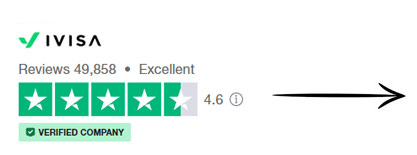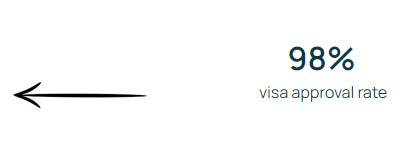Can you travel to Australia without a visa?
Plan your trip to Australia by understanding visa exemptions. Travel with confidence with this essential information.
 Fast: Simplified, efficient process.
Fast: Simplified, efficient process.
 Security: information is protected.
Security: information is protected.
 Reliability: 98% approval rate.
Reliability: 98% approval rate.
 Assistance: 24/7 customer support.
Assistance: 24/7 customer support.


Travelling to Australia is a dream for many globetrotters in search of extraordinary adventures, breathtaking landscapes and a unique culture. However, before you plan your itinerary and buy your plane ticket, a crucial question arises: "Do I need a visa to travel to Australia?" This question is of paramount importance, as visa requirements determine your eligibility to enter this vast continent. Understanding Australia's visa requirements is essential for any traveller wishing to explore this beautiful country. Whether you're planning to discover the Great Barrier Reef, visit cosmopolitan cities or venture into the vast outback, your visa status will be crucial. On this page, we'll demystify visa rules and exemptions to help you plan your trip to Australia with confidence.
Which countries can enter Australia without visa?
- British and European nationals: British, Belgian, Swiss, Canadian and European Union nationals do not need a visa but a travel authorisation to travel to Australia for tourism, business or family visits of less than 90 days.
- Electronic Travel Authorisation (eVisitor): Simply apply for an electronic travel authorisation (eVisitor) online free of charge before your departure. The application generally takes 24 hours to process.
- Validity of the eVisitor: The eVisitor is valid for 12 months from the date of issue and allows multiple entries into Australia.
- Other types of visa: If you wish to stay longer than 90 days in Australia, to work, study or live there, you must apply for a specific visa.
- Checking eligibility requirements: Before applying for an eVisitor or a visa, it is important to check the eligibility requirements on the Australian government website.


When considering travel to Australia, the first essential step is to determine the type of visa you need based on your circumstances. Here is an overview of the main groups of travellers who require a visa to enter Australia:
Australia offers visa exemptions to certain travellers depending on their status and nationality. Here are the main categories of people who can enter Australia without needing a visa:
Although some people can enter Australia without a visa, it is essential to know the conditions that apply to these exemptions. Here are the key points to remember:
Understanding who can enter Australia without a visa and the conditions that apply to these exemptions is essential to planning your trip with peace of mind. However, don't forget that even with a visa exemption, it is essential to comply with Australian laws and regulations during your stay.
When it comes to travelling to Australia without having to obtain a traditional visa, there are two particularly practical options available to travellers: the eTA (Electronic Travel Authority) and the eVisitor. These solutions greatly simplify the process of entering Australia and are designed for travellers meeting certain conditions.
These electronic travel authorisations are easy to obtain and take less time to process, as the procedure is carried out entirely online, in just a few minutes. Processing time is generally less than 72 hours.
The eTA is an electronic travel authorisation that allows travellers from certain countries to visit Australia for tourism, business or family purposes for up to three months. Countries eligible for the eTA include the United States, Canada, the United Kingdom, Brunei, Hong Kong, Japan, Singapore, Malaysia, Taiwan and South Korea.
The eVisitor is similar to the eTA, but is mainly intended for European travellers. You will find the full list of countries eligible for eVisitor below (subject to change, please check the Australian Government website):
Andorra, Austria, Belgium, Bulgaria, Croatia, Cyprus, Czech Republic, Denmark, Estonia, Finland, France, Germany, Greece, Hungary, Iceland, Ireland, Italy, Latvia, Liechtenstein, Lithuania, Luxembourg, Malta, Monaco, Netherlands, Norway, Poland, Portugal, Romania, San Marino, Slovakia, Slovenia, Spain, Sweden, Switzerland, Vatican City, United Kingdom.
Here is the procedure for obtaining an eTA or eVisitor via an online service provider:
Attempting to enter Australia without a visa, eTA or eVisitor is illegal and strongly advised against.
Risks involved :
Find out if your question has been answered in the list below
Yes, in most cases a visa is required to travel to Australia. However, there are visa exemptions for certain travellers depending on their nationality, the length of their stay, and the reason for their visit. It is essential to understand the specific requirements that apply to your situation before planning your trip to Australia.
Several categories of travellers can enter Australia without a visa. These include Australian citizens and permanent residents, as well as passport holders from specific countries that benefit from bilateral agreements. In addition, travellers in transit through Australia for a short period may also be exempt from the visa requirement. However, it is vital to comply with the specific entry requirements for each category.
To determine whether you are eligible for a visa exemption for Australia, you need to check your nationality and the reason for your trip. The Australian government's official website provides detailed information on visa exemptions and the conditions that apply to each category of traveller. You can also consult the Australian embassy or consulate in your country of residence for advice specific to your situation.